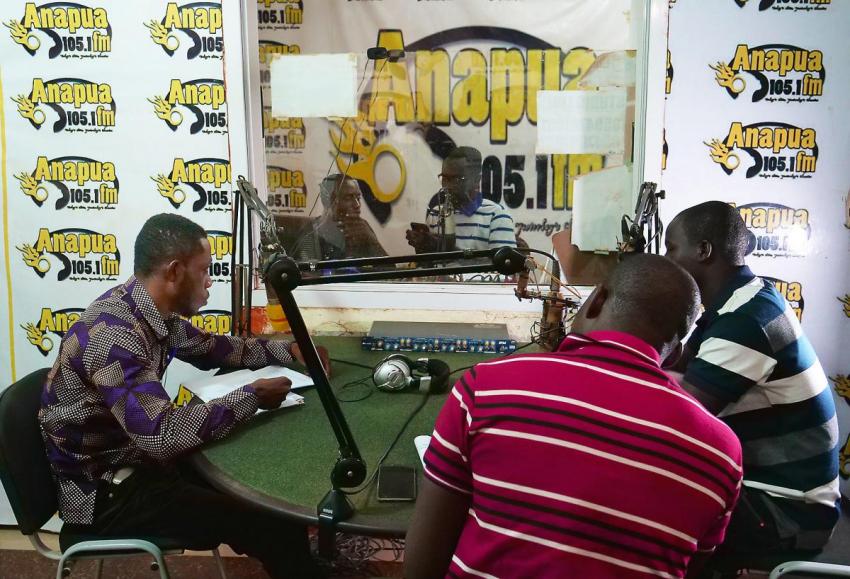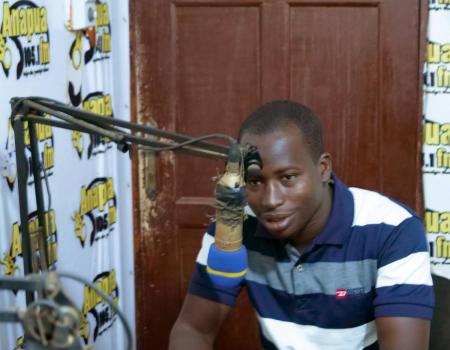Reporting back on the radio to the public on progress made around water and sanitation in Asutifi North District.
Published on: 29/05/2020
Material prepared by a team from the Ghana National Development Planning Commission and IRC Ghana

Joel Asubonteng, WASH desk officer in Asutifi North (left) speaks to listeners at Radio Anapua with colleagues Dawuda Hafiz representing Kenyasi civil society organisations (centre) and Yachori Bashiru, research assistant from Aquaya Institute (right)
Radio station presenter Pious Amansoro opens his programme with a cheery greeting for his listeners. On the other side of the studio glass his guests introduce themselves around a bank of microphones.
This is the monthly opportunity on Radio Anapua FM for WASH experts to speak directly to the people of Asutifi North about their water supply and what is being done to improve it.
Joel Asubonteng, the WASH desk officer for Asutifi North District Assembly, reminds listeners that they need to bring any complaints to him so that they can be addressed. He reports that as a result of calls the District Assembly and World Vision are working towards providing water to Kwanfifin community, and World Vision was also travelling to Yaabrefo to examine a broken borehole.
A direct line to his desk at the Assembly receives and logs complaints and Joel ensures they are acted on. This monthly programme on Radio Anapua is one of his main methods of reporting back to the public about what progress is being made.
Today’s programme focuses on water quality testing.  Yachori Bashiru, from Aquaya Institute, one of the partners in the Asutifi WASH initiative known as ANAM, informs listeners that they have arranged for the Ghana Water Company to test ten water systems each month.
Yachori Bashiru, from Aquaya Institute, one of the partners in the Asutifi WASH initiative known as ANAM, informs listeners that they have arranged for the Ghana Water Company to test ten water systems each month.
He points out that you cannot tell by looking at water whether it carries infectious pathogens, and that by law systems in Ghana should be regularly tested. “When you take Africa, we don’t do much about the testing of our water systems hence most top ten sicknesses detected in our hospitals are water related, including cholera and diarrhoea. For us to provide quality water for all, there is the need to undertake water quality testing to determine how good or bad the water is for use. Then we can decide what measures to put in place for treatment.”
Also present in the studio is Dawuda Hafiz representing civil society organisations in the Kenyasi area. He talks about the need to educate the public about the importance of good water and sanitation. The ANAM initiative is a 13-year programme to resolve these issues in Asutifi North.
“The provision of water and the water quality tests as well as the need for practising good sanitation, all reduce the risks of diseases. The WASH initiatives with other partners are very good with the aim of reaching out to 84,000 people with access to good drinking water by the end of 2030.”
It’s a lively show and the chat goes back and forth, expertly handled by the presenter. Pious Amansoro signs off and promises the listeners that – God willing - Joel and colleagues will be back for another WASH special next month.
At IRC we have strong opinions and we value honest and frank discussion, so you won't be surprised to hear that not all the opinions on this site represent our official policy.